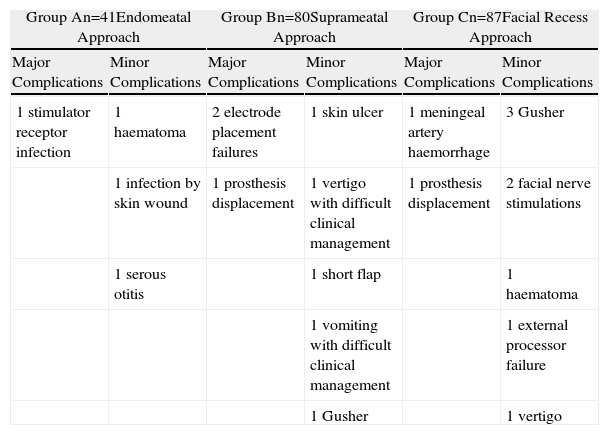Complications are very sensitive indicators of the usefulness of a surgical technique. In cochlear implant surgery, there are 3 principal approaches: the classic approach uses the facial recess (FR), the suprameatal approach (SMA) does not require mastoidectomy and uses the creation of a tunnel over the facial nerve to enter the middle ear, and the endomeatal approach (EMA) is based on the completion of a groove in the posterior wall of external auditory canal.
Material and methodsA multicentre review of 208 patients with cochlear implants was performed for comparing the different techniques. The complications were classified into major and minor.
ResultsAmong the 208 implanted patients, 10.5% (22 of 208) had complications. Of these, 2.88% (6 of 208) were major complications and 7.69% (16 of 208) were minor complications. Comparing the results obtained by the different approaches, the FR technique had the lowest rate of major complications (1.1%), followed by the EMA technique with 2.38% and SMA with 3.75%. As for minor complications, operations in the SMA group had the lowest rate (6.25%), followed by the EMA group (7.14%) and the group operated on using the FR technique presented the highest (10%).
ConclusionsThe 3 techniques described show very similar rates of complications. Consequently, we can conclude that they are safe and are alternatives.
Las complicaciones son un indicador muy sensible de la utilidad de una técnica quirúrgica. En cirugía de implante coclear se pueden utilizar 3 abordajes: el abordaje clásico utiliza el receso facial (RF) para el paso del electrodo; el abordaje suprameatal (SMA) no requiere mastoidectomía y utiliza la creación de un túnel que pasa por encima del nervio facial para entrar a la caja del tímpano desde atrás, y el abordaje endomeatal (EMA) que se basa en la realización de un canal en la pared posterior del conducto auditivo externo.
Material y métodosEstudio multicéntrico de revisión de 208 pacientes, comparando las diferentes técnicas de abordaje descritas. Se clasificaron las complicaciones en mayores y menores.
ResultadosEntre los 208 pacientes implantados el 10,5% (22 de 208) presentó complicaciones, de estas el 2,88% (6 de 208) fueron complicaciones mayores que llevaron a la reimplantación y el 7,69% (16 de 208) fueron complicaciones menores. Comparando los resultados obtenidos por los diferentes grupos, podemos decir que la técnica del RF es la que menos porcentaje de complicaciones mayores tuvo, 1,1% seguida de la técnica EMA con un 2,38% y la SMA con un 3,75%. En cuanto a las complicaciones menores, el grupo operado por SMA tuvo el menor porcentaje presentando el 6,25%, seguido del grupo operado por EMA con el 7,14% y el grupo operado por el RF presentó el 10%.
ConclusionesLas 3 técnicas quirúrgicas descritas muestran un porcentaje de complicaciones muy similar. Por lo tanto, podemos concluir, que las 3 técnicas son seguras y alternativas unas con otras.
Artículo
Comprando el artículo el PDF del mismo podrá ser descargado
Precio 19,34 €
Comprar ahora








